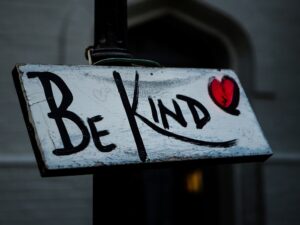The World Could Use More Kindness
 Photo by Adam Nemeroff on Unsplash
Photo by Adam Nemeroff on Unsplash “We’re enmeshed in some sort of emotional, relational, and spiritual crisis, and it undergirds our political dysfunction and the general crisis of our democracy,” wrote David Brooks in his September 2023 article on “How America Got Mean” in The Atlantic. He reflected on the many ways our country has gotten sadder and meaner; from increased rates of depression to decreased personal relationships, from mistreating service workers to rising hate crimes. His examples and statistics are filled with despair and anxiety for our future, yet he shares a solution: “In a healthy society, a web of institutions—families, schools, religious groups, community organizations, and workplaces—helps form people into kind and responsible citizens, the sort of people who show up for one another.”
We need kindness at all levels of society to ensure it flourishes beyond World Kindness Day—celebrated each November 13th since 1998—and improves how we care for ourselves, each other, and the world around us. If kindness is taught in schools and practiced at home, children are more likely to value and express it in their relationships. If toxic personalities and inhumane working conditions—by the customers or management—aren’t addressed in workplaces, employers will lose talented workers and the economy will suffer. If politicians can’t work with each other to serve all of their constituents, a greater burden is put on religious and secular organizations and mutual aid networks to care for their communities. And if we use all our energy being kind to others without being gracious to ourselves, we risk burnout and health issues. Rest and recovery are important aspects of personal care and can inspire such behavior in others, helping to spread kindness further.
Showing up for others doesn’t mean forcing what works for you onto them. It means listening and truly hearing, striving to understand their experiences and needs, and taking the appropriate action. Some refer to it as the Humanist Golden Rule or the Platinum Rule: Treat people as they would like to be treated. Acts of kindness can range from small gestures like greeting people and sending thoughtful messages to big projects like caring for an injured individual or donating an organ. Helping others benefits our own mental health and well-being by reducing stress, improving self-esteem, increasing happiness, and strengthening social connections. Caring for others might require us to take accountability and responsibility for harm we’ve caused—intentionally or unintentionally—or confront others causing harm. This can include practicing nonviolent communication, conflict resolution, restorative practices, and will take ongoing investment to rebuild trust.
Intentional and ongoing kindness will be even more needed after recent US elections have left many of us terrified of the dangers to come. To accommodate the influx of messages following election day, crisis services are expanding their hours and resources, especially for the LGBTQ+ community. The Trevor Project crisis services reported a “nearly 200% increase in conversation topics related to the election” and found that “90% of LGBTQ+ young people said recent politics negatively impacted their well-being.” Brent Satterly, a social work professor at Pennsylvania’s Widener University, shared that the most important thing allies can do is not minimize the concerns of their LGBTQ+ family and friends. He also recommended practical care options like helping with chores, taking on tasks, and being in company with people, whether or not they want to talk. To help people handle stress and anxiety, March for Our Lives prepared a detailed collection of mental health resources including organizations to text, call, and volunteer with.
While we’re all processing life struggles and current events in different ways, be assured that you’re not alone and people want to connect with you. We welcome all to join the American Humanist Association for an online discussion called “Now What? We Heal” on Wednesday, November 13, at 6pm ET. It’s a chance to share, get inspired by humanist professionals, and learn how to take action locally and nationally. Let’s together work towards a kinder and healthier world.
